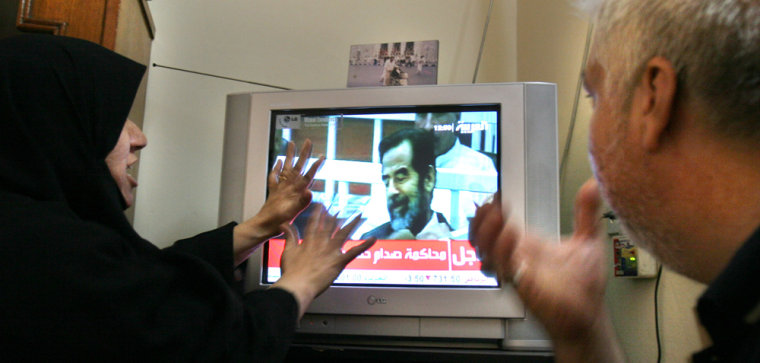Bursting into applause at Saddam Hussein's resolve, Sunni Arab customers in a north Baghdad barbershop on Wednesday welcomed the undaunted reappearance of their fallen leader.
"I swear he is a hero," Mohammed Yousif cried, as men around him cheered televised images of Hussein refusing to identify himself to the tribunal convened to try him. "Look at his brave and strong look!"
"You know me," Hussein, unbowed two years after disappearing into American custody, told the trial when it opened Wednesday. Rejecting a judge's repeated request to state his name for the record, he declared: "If you are Iraqi, you know me."
And Iraqis did, in wildly disparate ways.
Across the country, Sunnis, Shiites and Kurds within range of a television were caught up by the image of the 68-year-old man who dominated their lives for three decades, gone from paunchy to wiry in prison, his hair dyed inky black, now clasping the steel rails of the defendants' enclosure.
In Dujail, the Shiite village north of Baghdad that lost 143 men to Hussein's executioners -- the killings that form the basis of the charge he faces -- small groups of men ringed a television outside the mayor's office. As light rain fell, the men strained to hear the patchy audio from the courtroom.
After would-be assassins opened fire on the leader's convoy in 1982, Hussein's forces razed the village, hauling away the men and older boys to prison and the women and children to desolate stockades in the desert.
Villagers begged for mercy
"I still remember his look when he turned his face while they were dragging him outside the house," said Basheer Hikmat Abad Ali, grasping a photograph of his father, arrested and executed when Ali was 4 years old. "He looked at my mother and then to us just like he was telling her, 'Take care of them -- I don't think that I am coming back,' " the 28-year-old said.
Arab and Western networks throughout the day played newly surfaced footage of Hussein visiting the village immediately after the shooting, interrogating rounded-up village men.
"I'm begging you sir, I'm begging you, I'm begging you," a slight village man in a white dishdasha pleaded in a captured moment of the drama. Hussein turned away. "Separate them. Question them," he ordered.
"Death to Saddam!" men in Dujail cried Wednesday, waving faded black-and-white photos of brothers, sons and fathers, as women in black abayas held other portraits to their breasts, in a haze of fog and sandstorm. "We want him executed."
Demonstrators support fallen leader
For the minority of Sunni loyalists, the sight of Hussein unbent and unrepentant before the court appeared to lift their fallen spirits more than his being called to trial and possibly facing death depressed them.
In Auja, birthplace of the toppled leader, a distant cousin of Hussein declared: "This is not right!" She was among groups of women who gathered in darkened houses to watch the proceedings and pray for Hussein. She broke into tears. "What kind of conspiracy plotted to put this knight in a cage like this?"
In Auja and Tikrit, the city claimed by Hussein as his ancestral base, demonstrators took to the streets with framed portraits, tapestries and anything else that bore a picture of Hussein, revealing images often secreted away for fear of confiscation by Iraqi or U.S. troops.
Waving Hussein's photos, the demonstrators chanted amid the honking horns of cars that weaved through the crowd. Men and boys joined by high school girls released from class called out, "Saddam, your name struck America."
At the barbershop in Adhamiya, the loyalist Hussein neighborhood where he made one of his last public appearances in early April 2003 as U.S. troops closed in on Baghdad, customer Ahmed Najim covered his eyes when the TV broadcast revealed that the head judge to try Hussein was Kurdish.
"As if the Arabs are a minority now, and the Kurds are the majority," Najim muttered.
The Sunnis in the barbershop denounced the court as American-made. They rejected the charges of state-run mass killings of opponents in the 1980s. "There were enemies that should be fought," Yousif said, referring to whole families and villages of Kurds and Shiites who were wiped out.
"The women and children who were killed were wives and children of these enemies. When the resistance fought in Fallujah, didn't the Americans destroy the whole the city?"
